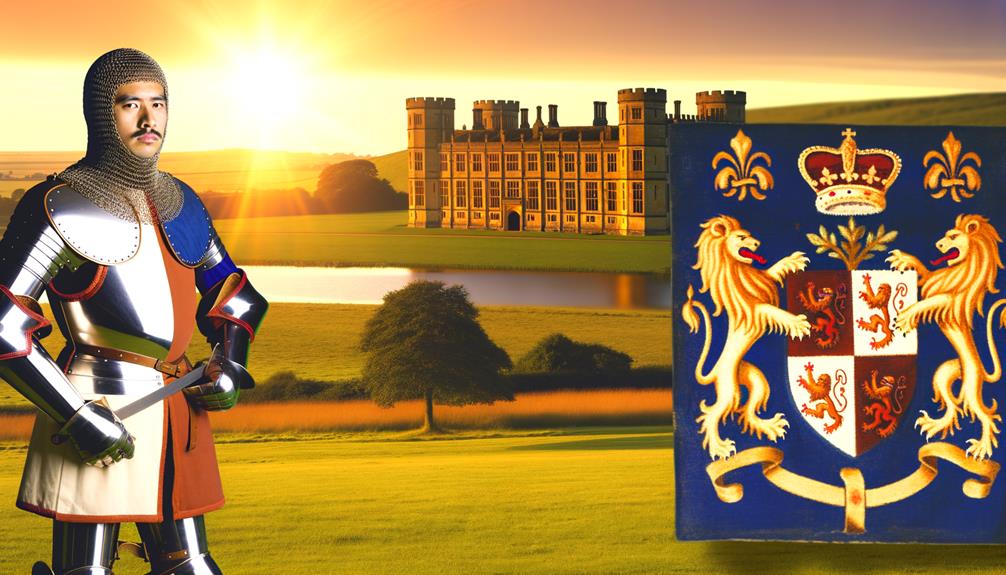Edward Name Meaning and Origin
The name Edward is derived from the Old English elements 'ēad,' meaning 'wealth' or 'fortune,' and 'weard,' signifying 'guardian' or 'protector.' This name encapsulates values of nobility and responsibility, prevalent in early medieval societies. Historically, it is associated with influential figures like Edward the Confessor and Edward Jenner, reflecting its enduring legacy.
The name is intrinsically linked to English royalty, with monarchs such as Edward I and Edward III leaving indelible marks on history. Additionally, several saints and literary characters bear the name, further enriching its cultural significance.
Exploring these connections offers valuable insights into its profound legacy.

Key Takeaways
- The name Edward originates from Old English elements meaning 'wealth' and 'guardian'.
- Edward symbolizes nobility, responsibility, and the duty to protect and manage resources.
- Historically significant figures named Edward include Edward the Confessor and Edward Jenner.
- The name is linked to English royalty, including King Edward I and Edward III.
- Edward is prominently featured in literature and popular culture, reflecting its enduring legacy.
Etymology of Edward
The name 'Edward' originates from the Old English elements 'ēad,' signifying 'wealth' or 'fortune,' and 'weard,' denoting 'guardian' or 'protector.'
This etymological composition encapsulates a sense of nobility and responsibility, traits highly valued in early medieval societies. The combination of these elements reflects the socio-cultural emphasis on safeguarding prosperity and ensuring the welfare of the community.
Such names were often bestowed upon individuals destined for leadership roles, symbolizing their duty to protect and manage resources wisely. The linguistic roots of 'Edward' offer a glimpse into the values and priorities of the Anglo-Saxon era, providing a rich context for understanding the enduring popularity and significance of the name throughout history.
Historical Significance
Rooted in its etymological origins, the name 'Edward' manifests its historical significance through its association with numerous influential figures, particularly within the context of English royalty and governance. The name, derived from Old English elements 'ēad' (wealth, fortune) and 'weard' (guardian), has been borne by notable personalities who shaped defining moments in history.
Notable bearers of the name have contributed to the cultural and political landscape through their leadership and vision.
- Edward the Confessor: A pivotal figure in pre-Norman Conquest England.
- Edward Jenner: Pioneered the smallpox vaccine, transforming medical practice.
- Edward Elgar: Composed significant works in classical music, influencing the arts.
These individuals underscore the enduring legacy embedded in the name 'Edward.'
Royal Connections
Throughout history, the name 'Edward' has been intrinsically linked with English royalty, epitomized by figures such as King Edward I, Edward III, and Edward VIII, each of whom left indelible marks on the monarchy and the nation. King Edward I, known as 'Longshanks,' was instrumental in consolidating English power. Edward III's reign saw the flourishing of chivalry and the beginning of the Hundred Years' War. Edward VIII's abdication in 1936 marked a pivotal moment in the British monarchy, leading to significant constitutional changes.
| Monarch | Reign Period |
|---|---|
| Edward I | 1272 – 1307 |
| Edward III | 1327 – 1377 |
| Edward VIII | January – December 1936 |
| Edward VII | 1901 – 1910 |
These monarchs underscore the enduring influence of the name 'Edward' in English history.
Saints Named Edward
Saint Edward the Confessor, one of England's most revered monarchs, is celebrated for his piety and contributions to Westminster Abbey, which he commissioned.
In addition to this prominent figure, there exist several lesser-known saints named Edward, whose contributions to Christianity and local communities are significant yet often overlooked.
Analyzing these historical figures provides a thorough understanding of the name's ecclesiastical impact and enduring legacy.
Saint Edward the Confessor
Among the various historical figures named Edward, one of the most venerated is Edward the Confessor, the last Anglo-Saxon king of England, who reigned from 1042 until his death in 1066. Renowned for his piety and dedication to the Church, Edward played a pivotal role in shaping medieval England. His canonization in 1161 by Pope Alexander III solidified his status as a saint.
Edward's reign was characterized by:
- Construction of Westminster Abbey: A monumental architectural achievement and a symbol of his religious devotion.
- Political Stability: Despite internal and external challenges, his reign was marked by relative peace.
- Succession Crisis: His death led to a power vacuum, culminating in the Norman Conquest of England.
Lesser-Known Saint Edwards
While Saint Edward the Confessor is widely celebrated, there exist other lesser-known saints named Edward whose contributions and legacies also offer intriguing insights into the religious and historical tapestry of their times.
One such figure is Saint Edward the Martyr, who ascended to the throne of England in 975 AD. His short reign was marked by political strife, and his untimely assassination in 978 led to his veneration as a martyr.
Another is Saint Edward of Athelney, a hermit who lived during the 9th century and was known for his piety and dedication to the monastic life.
These lesser-known Edwards, though not as prominent as the Confessor, enriched the religious landscape with their unique stories of faith and sacrifice.
Literary References
The name Edward has held a significant presence in literature, prominently featured in works ranging from the medieval epic 'Beowulf' to modern novels like Stephenie Meyer's 'Twilight' series.
In 'Beowulf,' the character Edward serves as a symbol of noble heritage and valor, reflecting the name's Anglo-Saxon roots.
Shakespeare's 'King Lear' introduces Edmund, a variant of Edward, portraying complex themes of legitimacy and power.
In contemporary literature, Edward Cullen from 'Twilight' epitomizes the eternal and tortured romantic hero, bringing the name into popular culture.
These diverse literary references underscore the name's enduring appeal and versatility across genres.
Popularity Over Time
Charting the trajectory of the name Edward through history reveals its fluctuating yet persistent popularity, underpinned by its royal connotations and literary significance.
Historically, the name saw widespread use in medieval England, propelled by several monarchs, including Edward the Confessor and Edward I. This royal association bolstered the name's prestige, ensuring its longevity.
In the Victorian era, Edward experienced a resurgence, partly due to literary figures and the reign of Edward VII. The 20th century witnessed peaks and troughs, with the name remaining consistently in use but never reaching the zenith of earlier periods.
Presently, Edward maintains moderate popularity, valued for its classic, timeless appeal. This enduring usage underscores the name's adaptability across generations.
Variations and Nicknames
Among the numerous variations and nicknames derived from the name Edward, each reflects its historical and cultural journey, from medieval diminutives to contemporary adaptations. The name Edward, of Anglo-Saxon origin meaning 'wealthy guardian,' has evolved through centuries.
Variations include:
- Eduardo: The Spanish and Portuguese adaptation, highlighting the name's international reach.
- Édouard: The French variant, illustrating the name's integration into different European cultures.
- Eadweard: An Old English form, demonstrating its deep historical roots.
Common nicknames such as Ed, Eddie, and Ted also contribute to its enduring popularity. These adaptations and diminutives not only offer insight into linguistic changes over time but also underscore the name's versatility and widespread appeal across different cultures and eras.
Famous Edwards
Exploring the legacy of the name Edward, one cannot overlook the numerous influential figures who have borne this name and left an indelible mark on history, culture, and various fields of human endeavor. From monarchs to scientists, Edwards have greatly contributed to societal progress.
| Name | Contribution |
|---|---|
| Edward III | Key figure in the Hundred Years' War |
| Edward Jenner | Pioneer of the smallpox vaccine |
| Edward Hopper | Renowned American realist painter |
| Edward R. Murrow | Iconic broadcast journalist |
Edward III's military strategies reshaped medieval Europe, while Edward Jenner's medical innovations saved countless lives. The evocative artistry of Edward Hopper captured American life, and Edward R. Murrow's journalistic integrity set standards in media. These Edwards exemplify the name's enduring impact.
Conclusion
The name Edward, rooted in Old English etymology, signifies wealth and guardianship. Historically, it carries royal connotations and has been borne by numerous saints, reinforcing its religious and cultural significance. In addition to its regal associations, Edward has been a popular name among nobility and aristocracy throughout history. In more recent times, it has also been favored by literary figures and political leaders, further solidifying its enduring appeal. Another name with significant meaning is Aloysius. Aloysius name meaning is derived from the Latin name Aloisius, which is believed to mean “famous warrior.
Literary references and its popularity over centuries underline its timeless appeal. Variations and nicknames further diversify its usage.
Addressing concerns about a lack of visual representation, the name's rich historical backdrop and sustained relevance provide a thorough understanding, rendering visual aids supplementary rather than essential.






